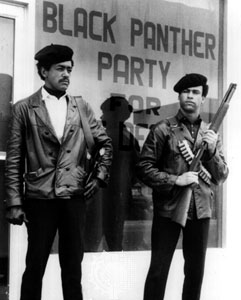Summary | Excerpt | Reviews | Beyond the Book | Read-Alikes | Genres & Themes | Author Bio

This article relates to Solitary
 In October of 1966, Huey P. Newton and Bobby Seale of Oakland California founded the Black Panther Party for Self-Defense, which later became the Black Panther Party. Although the Party disbanded in 1982 only 16 years after its creation, it remains one of the largest and most controversial black revolutionary organizations in history. Known for encouraging militant self-defense of minority communities against the United States government, the Black Panther Party worked to establish economic, social and political equality through international socialist ideals, mass organizing and community-based programs.
In October of 1966, Huey P. Newton and Bobby Seale of Oakland California founded the Black Panther Party for Self-Defense, which later became the Black Panther Party. Although the Party disbanded in 1982 only 16 years after its creation, it remains one of the largest and most controversial black revolutionary organizations in history. Known for encouraging militant self-defense of minority communities against the United States government, the Black Panther Party worked to establish economic, social and political equality through international socialist ideals, mass organizing and community-based programs.
The Black Panther Party had a ten-point platform and program based on members' desires and beliefs. Newton said that they strove "to serve the needs of the oppressed people in our communities and defend them against their oppressors." In the words of the Party, here is an outline of the points:
In practice, the work of the Black Panther Party involved developing a Free Breakfast for Children program, reaffirming black beauty through positive art, words and imagery, and efforts to educate minority groups through literacy programs, informational texts and community discussion. It involved pooling community resources to meet the needs of others, from medical bills to legal fees. As told by Albert Woodfox in his book Solitary, it involved achieving humane prison reform, too, from dialing down unnecessary and invasive strip searches to freeing the falsely accused.
In addition to the black-focused work done by the Black Panther Party, the organization advocated for equity and advancement of all minority groups. In fact, women played an integral role in the Party. They took on leadership roles, organized in their communities and spoke out against sexism within the organization. Other intersectional efforts surfaced in alliances through the Black Panther Party's Rainbow Coalition movement, with groups including the Young Lords, Young Patriots and the Native American Housing Committee. The Young Lords were an international, Marxist, revolutionary human rights group founded by first generation Puerto Rican immigrants. The Young Patriots were impoverished white Southern migrants intent on alleviating racist, classist oppression through antifascist, revolutionary means. The Rainbow Coalition as a whole focused on common goals related to equal opportunity: the end of white supremacy, the end of housing discrimination, the end of police violence and the end of racism.
Many people know the Black Panther Party for their militant actions, including shocking displays of public protest. On May 2, 1967, the Party gained worldwide media attention in a protest against the Mulford Act, legislation developed to restrict the right to openly carry loaded weapons. Around two dozen armed members entered the California state capitol in Sacramento and read an executive mandate in response to the legislation before being disarmed.
In addition to growing public influence and acts of protest, the Black Panther Party's association with other radical movements, such as communist and socialist movements, instilled fear in the United States government. Although the Federal Bureau of Investigation's counterintelligence program designed to silence political dissidents—COINTELPRO—launched before the Black Panther Party was founded, the group became a primary focus after the assassination of Martin Luther King Jr. According to FBI documents, COINTELPRO was created to "expose, disrupt, misdirect, discredit, and otherwise neutralize the activities of Black nationalists." Tactics involved efforts to create factionalism, including harassment, raids, infiltration and specific efforts to encourage violence, both within the Black Panther Party and between the Party and the community. Other watched groups included the Student Nonviolent Coordinating Committee, Southern Christian Leadership Conference, Revolutionary Action Movement and Congress of Racial Equality.
The Black Panther Party collapsed under the weight of discrediting media portrayals, public fears, governmental actions and internal disagreements. However, their impact on the civil rights movement was fundamental and unequivocal. To learn about one man's experiences within the Black Panther Party and prison system, read Solitary by Albert Woodfox.
Co-founders of the Black Panther Party Bobby Seale (left) and Huey P. Newton (right)
Filed under People, Eras & Events
![]() This "beyond the book article" relates to Solitary. It originally ran in March 2019 and has been updated for the
December 2019 paperback edition.
Go to magazine.
This "beyond the book article" relates to Solitary. It originally ran in March 2019 and has been updated for the
December 2019 paperback edition.
Go to magazine.
Experience is not what happens to you; it's what you do with what happens to you
Click Here to find out who said this, as well as discovering other famous literary quotes!
Your guide toexceptional books
BookBrowse seeks out and recommends the best in contemporary fiction and nonfiction—books that not only engage and entertain but also deepen our understanding of ourselves and the world around us.